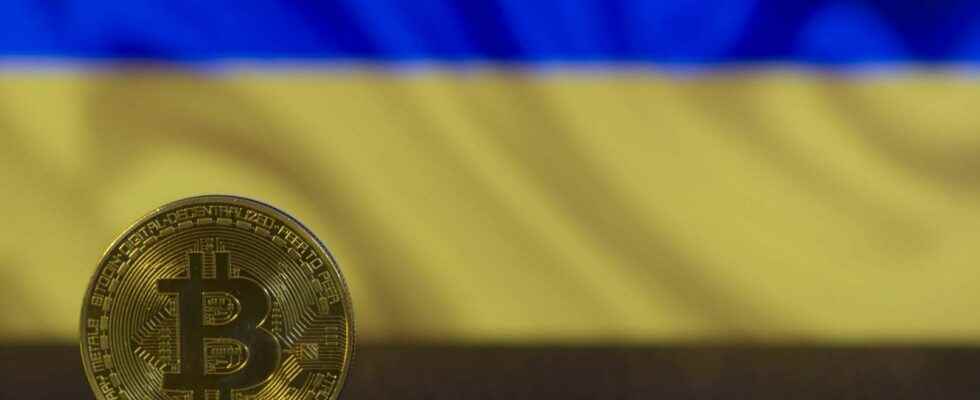You will also be interested
[EN VIDÉO] Bitcoin, how does it work? The SII Group and the School of Advanced Digital Technologies (ETNA) have developed a broadcast broadcast on the Internet called Blockchain Revolution. She explains in detail the phenomenon of the blockchain and bitcoin, this cryptographic currency which is much talked about. Here is, exclusively for Futura, a complete episode devoted to the practical aspects of bitcoin.
The Ukrainian nation stood as one against the Russian invasion and offers the world an exceptional lesson in courage. Despite these dramatic circumstances, the Ukrainian State was able to find resources by launching an appeal for donations in the form of cryptocurrencies to support his war effort. An unprecedented initiative that has enabled the government to collect tens of millions of dollars from around the world, from individuals as well as from companies and organizations. In the process, Ukrainian President Volodymyr Zelensky signed a bill on virtual assets in order to legalize the use of cryptocurrencies in Ukraine. A country that fights for its freedom and democracy, while being able to innovate for its future.
In order to measure the importance of the role of cryptocurrencies in this conflict and the prospects that are opening up, Futura spoke with an expert, Claire Balva, director of blockchain and cryptos at KPMG France.
Claire Balva, blockchain and crypto director at KPMG France. © Nathalie Oundjian
Futura: What effects of the conflict do you observe on the price of virtual currencies?
Claire Balva. At the time of the invasion, we saw a shock in the markets in general related to the uncertainty that is not only related to cryptocurrencies. Then prices rose fairly quickly and stabilized. For bitcoin and other cryptocurrencies, we have seen a sharp rise in volumes in rubles and hryvnias (Ukrainian currency, editor’s note), which is quite logical in situations of uncertainty or political and economic instability where cryptos are a safe haven. However, this is not to say that the price of bitcoin is linked to the war in ukraine because these movements remain anecdotal in relation to the mass overall. On the durationno specialist can very seriously know what the impact of the conflict is on the price of cryptos.
Do cryptocurrencies play an unprecedented role in this war, especially when it comes to donations to help the Ukrainian state and its people?
Claire Balva. Calls for cryptocurrency donations are nothing new. On the other hand, what is a first is the call for donations from a State, in this case Ukraine. The amounts collected are impressive and amount to several tens of millions of dollars (more than 56 million dollars according to the Ukrainian government, editor’s note). Individuals, companies, big names in crypto sent donations. We measure the importance of the global dimension of digital currencies with donations flowing in from a multitude of countries. The Ukrainian government has used part of these funds to equip and arm itself, with suppliers who have played the game by accepting payments in cryptos. This is proof that these tools can be used as safe havens and as currencies to trade both within a country and with foreign countries. Moreover, we observe more and more that cryptos are used as currencies while central banks are still striving to deny this fact.
Cryptos still have this false image of financing illicit activities
Can the Russian state circumvent sanctions with cryptocurrencies?
Claire Balva. I hear a lot about this eventuality. But in practice it is very complicated. Most crypto flows go through intermediaries who must comply with legislation and are subject to the same prohibitions as those imposed on banks as part of the international sanctions taken against Russia (Coinbase, one of the main cryptocurrency platforms). crypto exchange, a blocked 25,000 accounts belonging to Russian users, editor’s note). There is also a matter of volume. Today, Russia’s overall foreign trade is the same magnitude than the total capitalization of Bitcoin (between 500 and 800 billion dollars). It is therefore not realistic to imagine that the country can find in cryptos a lifeline to circumvent the sanctions. I would add that cryptos still have this false image of financing illicit activities. It is important to deny this because it is proven that the amounts of illicit transactions in cryptos are weaker than with fiat currencies, especially silver liquid.
Hard hit by economic sanctions, especially restrictions on means of payment, can the Russian population turn to cryptos as a lifeline?
Claire Balva. We observe statistically in Russia as in Ukraine an interest in cryptos, especially bitcoin. It is quite logical when we anticipate a devaluation of the national currency, we fall back on non-monetary solutions such as gold or cryptos, for example. On the rouble, we have seen a very clear increase in the volumes traded in bitcoin since the start of the conflict. But, again, this remains quite anecdotal compared to the mass of cryptos.
Some experts are talking about a new monetary order with a weakening dollar and the advent of cryptos. What long-term consequences do you foresee at the end of this conflict?
Claire Balva. In our “Outlook 2022” report released earlier this year, we anticipate that, like El Salvador last year, other countries will use bitcoin as legal tender. The conflict in Ukraine can become a symbol in the use of cryptos as currencies by states. But I consider that this development preceded these events. My conviction is that these tools are technologically extremely interesting and come to completely upset the financial sector by offering financial alternatives to populations who sometimes are not banked or have monetary solutions that do not allow it.
Interested in what you just read?
